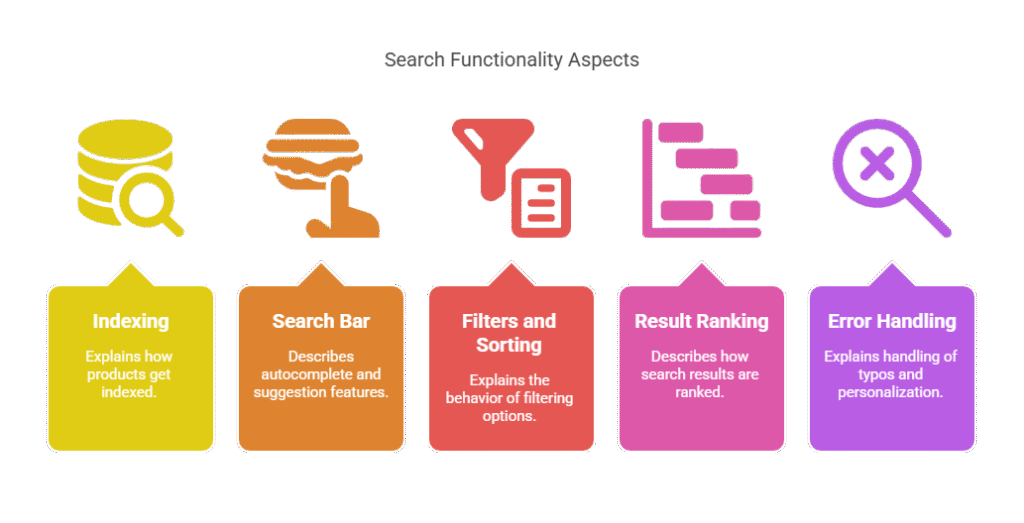When shoppers land on your ecommerce store, the clock starts ticking. They expect instant, relevant results the moment they begin typing in your search bar. If your search setups for ecommerce isn’t optimized, you risk losing attention—and revenue—within seconds.
In this guide, we’ll break down the essential elements of an effective ecommerce search setup, from foundational structure to advanced AI-powered enhancements.
What Is a Search Setup in Ecommerce?
Your search setup for ecommerce is the backend + frontend framework that powers your site’s search experience. It includes:

Think of it as your store’s internal GPS—guiding users to what they want, quickly and smoothly.
Core Components of a Strong Ecommerce Search Setup
1. Search Indexing
Make sure your product data (title, description, tags, category, variant info) is structured and indexed properly. This is the foundation for relevant results.
2. Autocomplete & Predictive Suggestions
Instantly suggest products, categories, and keywords as users type. This reduces effort and speeds up decision-making.
3. Smart Filters & Sorting
Enable users to refine results based on brand, price, color, size, rating, etc. Use smart filters that dynamically adapt to available inventory.
4. Typo Tolerance & Synonyms
Handle misspellings like “nikes shooz” and return the correct results. Map synonyms so “sofa” and “couch” behave the same.
5. Personalized Search Ranking
Use AI to prioritize results based on:
- User history
- Location
- Popularity
- Seasonality
Advanced Search Setups: AI + Analytics
Modern ecommerce players go beyond basic configurations by leveraging:
AI-Powered Search
- Understands long-tail queries and intent
- Re-ranks results based on behavior
- Auto-suggests trending or similar products
Search Analytics
Track:
- Zero-result queries
- Most searched terms
- Most clicked products
- Average search click position
Use this to fine-tune your search configuration continuously.
Tools to Build Effective Search Setups
🔸 Native Platforms
- Shopify Search & Discovery
- Magento ElasticSearch
- WooCommerce Search Plugins
🔸 Advanced Solutions
- ExpertRec AI Search: Plug-and-play AI search layer with smart ranking, filters, voice & visual search.
Best Practices for Search Setups in Ecommerce
| Tip | Why It Works |
|---|---|
| Optimize for mobile search | Most users search from phones |
| Include category + product suggestions | Helps users explore faster |
| Track & fix zero-result pages weekly | Saves missed revenue |
| Use AI for re-ranking & personalization | Boosts conversions |
| Show fallback results for vague terms | Prevents dead ends |
Final Thoughts: Search Setups Are Sales Setups
A seamless search setup for ecommerce isn’t a “nice-to-have”—it’s a conversion catalyst. The right setup helps users find products faster, reduces bounce, and increases AOV.
If you want to move beyond generic search and offer a personalized, revenue-driving experience, it’s time to rethink your setup.
Frequently Asked Questions
Q1. What is a search setup in ecommerce?
A search setup includes indexing, filters, ranking, and logic used to return relevant search results to shoppers.
Q2. Why is search important for ecommerce stores?
It helps users find what they want quickly, leading to better engagement and higher conversions.
Q3. What tools help improve ecommerce search?
Platforms like ExpertRec, Algolia, or ElasticSearch can enhance your native setup with AI and analytics.
Q4. What makes a good ecommerce search setup?
It should be fast, typo-tolerant, mobile-friendly, and personalized based on user behavior.
Q5. Can AI improve search performance?
Yes. AI can personalize rankings, handle vague queries, and predict what users want with high accuracy.




